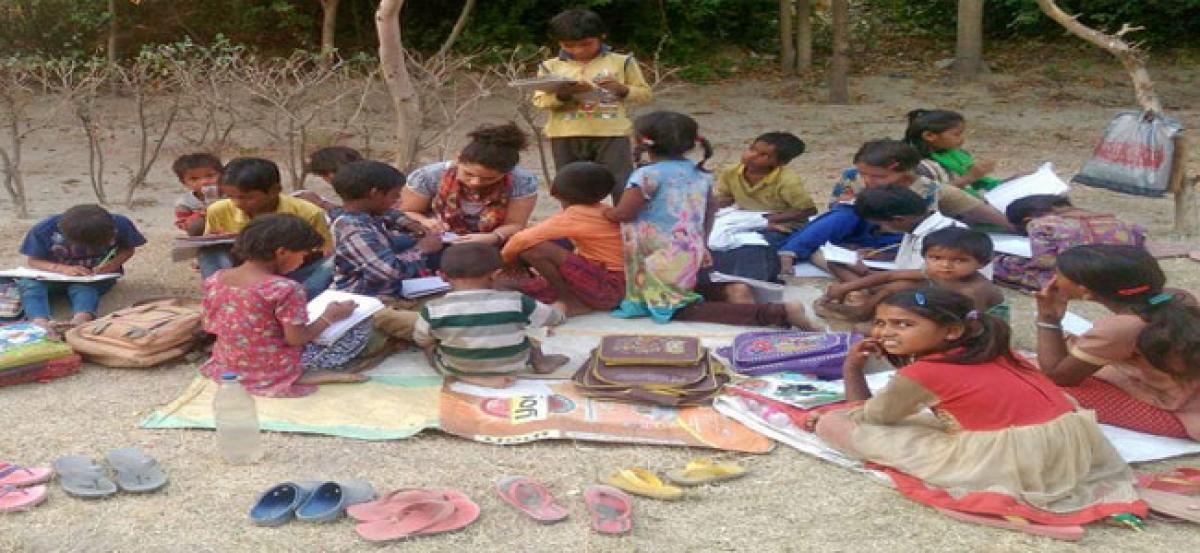Live
- PM Modi interacts with Joe Biden in Rio de Janeiro
- India rated as fastest growing G20 economy
- Maha campaign ends, polls tomorrow
- Assailants of Cong leader held after encounter; 2 hurt
- Manipur situation: 1 protester dead
- CID books Posani for defamatory comments against CM
- Bad weather: 15 flights diverted, over 100 delayed
- Raj HC stays posting of sub-inspectors
- AP, TG move forward to settle bifurcation issues
- Govt abolishes two-child norm for local body candidates
Just In

It is ironic that the government is inviting response from the public on AP Self-Financed Independent Schools (Estb & Reg) Act 2017, while conveniently shying away from responsibility of implementing the Right to Education Act.
Ongole: It is ironic that the government is inviting response from the public on AP Self-Financed Independent Schools (Estb & Reg) Act 2017, while conveniently shying away from responsibility of implementing the Right to Education Act.
Highlights:
- 15 lakh students deprived of chance to study in private schools
- According to the provision of the Act, 25% seats in private schools must be allotted to poor students
- AP mulling new act allowing private schools to charge any amount as tuition fees
According to statistics with National University of Educational Planning and Administration (NUEPA), 15 lakh economically poor and deprived children would get free education in private unaided schools, if Andhra Pradesh and Telangana governments implement the RTE Act successfully.
RTE Act provides 25 per cent reservation to the economically weak and deprived sections. According to the Act, the government will reimburse the fees to private schools for admitting poor students but only to the extent of the expenditure, it will incur, if those students were admitted in a government school.
According to the Unified District Information System for Education (U-DISE) data compiled by NUEPA for 2016-17, there are 14,005 private unaided schools in Andhra Pradesh with 28,25,752 students. In Telangana, there are 16,500 private unaided schools in Telangana with 30,48,351 students.
If the governments implement the Act in letter and spirit, 7,06,438 seats in AP and 7,62,088 seats in Telangana private unaided schools should be allotted to children from economically weaker and deprived sections of the society. However, that has not been the case.
Many NGOs filed cases against the government alleging its failure to implement the act, in vain. Speaking to The Hans India, BV Sagar, coordination with HELP a NGO which filed a case with Prakasam DLSA, said that it was responsibility of the district educational officers to see the private unaided schools follow RTE act and Supreme Court judgement.
“The DSLA has ordered the district education officer to respond to the petition and asked him to file a response why he is not implementing the RTE act and Supreme Court orders,” he informed.
B Vijaya Bhaskar, district education officer said that only 15 states have been implementing the provision of the act. “Andhra Pradesh and Telangana are not implementing the provision, fearing that they have to pay fees to the private schools. We have submitted to the DSLA that we are ready to implement the court orders as soon as we receive instructions from the state government,” he quipped.
Meanwhile, the government is inviting suggestions to the draft of AP Self-Financed Independent Schools (Estb & Reg) Act 2017, according to which, managements of the private schools can establish a school at any location and demand any amount in the name of tuition fees, building fund, capitation fees, books, uniforms etc. The parents, guardians or students will have no right to question or approach the court for justice.
Commenting on the draft, a government teacher from Ongole, on condition of anonymity said, “The draft bill is nothing but opening gates for looting by private schools.
At the same time, the Chief Minister says that there will be no force introduction of English medium in government schools. Instead of strict implementation of RTE Act, which promises education to poor students, the government is making education as a costly affair and a dream for the poor students.”
By Naresh Nandam

© 2024 Hyderabad Media House Limited/The Hans India. All rights reserved. Powered by hocalwire.com







